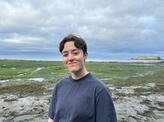Sophia DeLeonibus
Bio:
Sophia DeLeonibus is a sixth-year PhD candidate. Her work focuses on the history of identity, gender, and sexuality in American culture, science, and politics in the twentieth century. At Yale, Sophia is affiliated with the Yale Research Initiative on the History of Sexualities and has served as the co-chair of the Modern Europe Colloquium. Her work has been supported by the Yale Fund for Lesbian and Gay Studies and the MacMillan Center. She holds a B.A. in History and Political Science from Grinnell College.
Her dissertation, “Gender in the Age of Identity: Childhood and the Science of Sexuality in the Postwar United States,” traces the history of the concept of “gender identity,” from its origins in midcentury debates among psychoanalysts and sexologists to its pivotal place in American politics today. It tracks the origins of two new midcentury concepts––gender, from sexology, and identity, from psychoanalysis––and argues that their 1964 union in the term “gender identity” enshrined a new way for psychoanalysts, psychiatrists, sexologists, and others to investigate the childhood origins of adult sexuality. Though gender identity was also adopted by feminist, queer, and transgender thinkers in the late twentieth century and divorced from its scientific origins, this dissertation foregrounds how psychoanalysts, psychiatrists, and conversion therapists who adopted the language of gender identity have used it since the 1960s to position queer and transgender children as “unnatural” products of socialization gone awry. As the first study of the history of gender identity from early scientific debate to conservative politics, the project advances scholarship on the historical relationship between gender and sexuality and contextualizes our present moment of turmoil over gender. “Gender in the Age of Identity” is a queer history of debates over childhood gender nonconformity that examines how gender identity has become an overdetermined lens to imagine, predict, and regulate children’s sexual futures.
